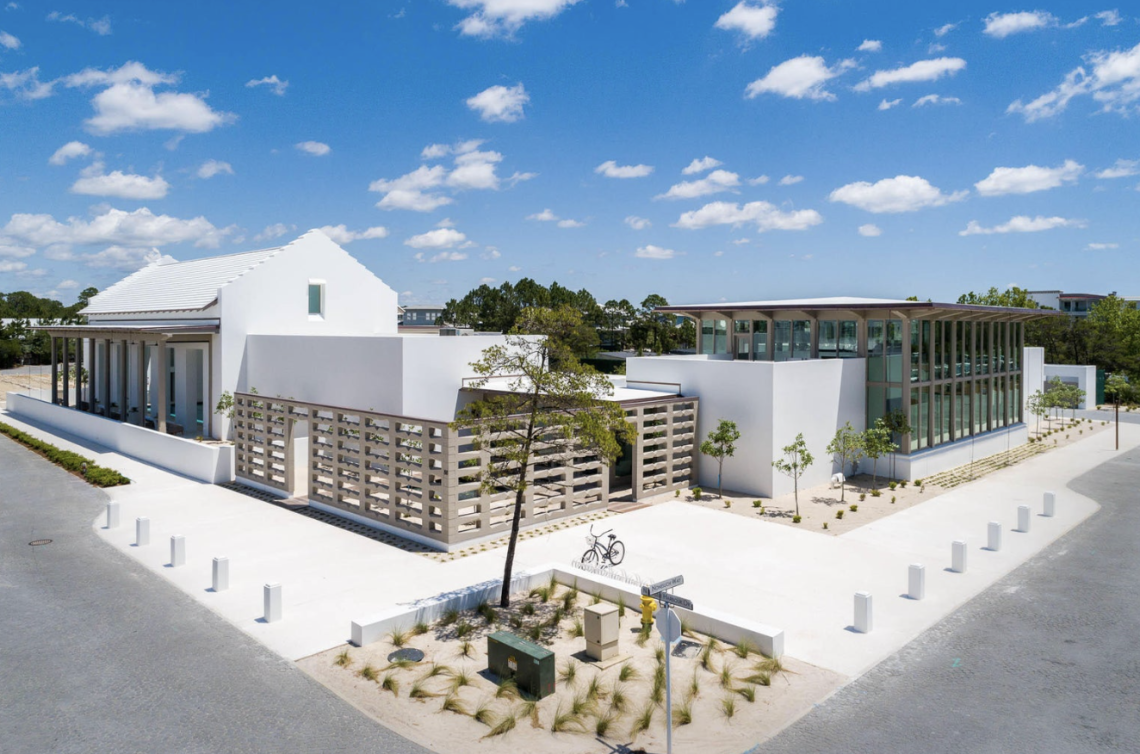Trump's "Big Beautiful Bill" Could Spark a 30A Investment Surge
Disclaimer: I am not a certified public accountant (CPA), and the information provided in this article is intended for general informational purposes only. It should not be construed as tax, legal, or financial advice. Before making any investment decisions or tax-related choices, please consult with a qualified CPA or financial advisor who can evaluate your specific situation.
If you’ve been sitting on the fence about buying investment property on 30A — especially with mortgage rates higher and competition a little thinner — there’s a proposed piece of legislation you need to have on your radar.
In May 2025, the U.S. House of Representatives passed the “One Big, Beautiful Bill,” a sweeping tax reform proposal backed by the Trump administration. One key component? The return of 100% bonus depreciation — a powerful tax strategy that, if it becomes law, could unlock enormous first-year tax deductions for real estate investors.
If you’re not fully familiar with how bonus depreciation works, or what it could mean for your financial future as a property owner on 30A, now’s the time to learn — and potentially act. In this article, I’ll walk you through what’s proposed, what’s still uncertain, and how the smart money is already preparing for what could be the next major catalyst in the beach investment market.
Let’s Start with the Basics: What Is Bonus Depreciation, and Why Does It Matter?
Depreciation in real estate is one of the great hidden levers of long-term wealth building. It allows you to deduct the cost of your investment property from your taxable income, spread out over time. But when we talk about “bonus depreciation,” we’re referring to the ability to accelerate that timeline — and in some cases, write off a massive portion of the property’s value in year one.
When the 2017 Tax Cuts and Jobs Act was passed, it temporarily allowed real estate investors to deduct 100% of the cost of certain depreciable property (mainly non-structural items like flooring, appliances, and landscaping) the same year they put it into service. That provision started phasing out in 2023, and here in 2025, we’re down to 60% — with scheduled decreases each year unless Congress steps in.
The proposed law would reverse that course, restoring 100% bonus depreciation for property acquired and placed in service after January 19, 2025 — and it would remain in effect through the end of 2029.
To the average buyer, that might sound like a footnote. But to a high-income investor or business owner looking to reduce taxable income? It’s a green light.

Where Things Stand Right Now
The return of 100% bonus depreciation is not yet law — but it’s no longer just an idea. As of May 2025, the House has passed the bill. The proposal is now in the hands of the Senate, where it awaits further debate and approval before it could be signed into law.
Here’s what we know about the current language in the bill:
It restores 100% bonus depreciation for qualified property placed in service after January 19, 2025.
It includes a retroactive effective date, meaning any property purchased after January 20 of this year would be eligible if the bill is passed.
It does not allow for “recapture” or amendment of returns for properties placed in service during years when bonus depreciation was below 100% (e.g., 2023 or 2024). In other words, you can’t go back and claim missed depreciation from earlier years — but you can move forward with confidence if your timing lines up.
The key takeaway? If you’re under contract on a property or considering a purchase this year, and the bill becomes law, you could still benefit from the full deduction — without waiting to buy.
So, What Would This Mean for 30A Property Owners and Buyers?
Let’s break it down as plainly as possible: a return to 100% bonus depreciation has the potential to supercharge the return on investment for short-term rental and vacation home buyers on 30A.
Imagine this — you purchase a $1.5 million vacation rental property, which isn’t uncommon in places like Seagrove, WaterColor, or Prominence. You plan to rent it out for most of the year and expect about $115,000 in gross rental income. After expenses, you’re left with a respectable net income — but then comes the kicker.
With a cost segregation study (more on that in a minute), a significant portion of that $1.5M purchase could be reclassified into short-lived assets that qualify for full bonus depreciation. On a property of that size, it’s not uncommon to uncover $300,000 to $400,000 worth of qualifying assets. If you're in a 35% tax bracket, that deduction could reduce your tax liability by over $100,000 in the first year alone.
That’s real, tangible savings — not over 27.5 years, but right now. It could mean keeping more capital in your pocket, offsetting income from other ventures, or funding additional improvements or acquisitions.
And this isn’t just a hypothetical benefit. For many of the investors I’ve worked with over the years, depreciation strategies have made the difference between “decent” returns and portfolio-shifting gains.

The Role of Cost Segregation: Your Key to Unlocking Bonus Depreciation
Now, it’s not as simple as buying a beach house and writing off $300K on your taxes. To capture these accelerated deductions, a cost segregation study is essential.
A cost segregation study is a specialized analysis that breaks your property into component parts — things like cabinetry, lighting, landscaping, appliances, and even specialty plumbing or electrical — and categorizes them into shorter-lived asset classes.
These categories allow you to legally depreciate large portions of the property faster than the standard 27.5 years. If 100% bonus depreciation is restored, those shorter-life assets could be written off entirely in the first year.
The study itself is typically conducted by engineers or accountants who specialize in this kind of work. It usually costs a few thousand dollars up front, but the return on that investment is often 10 to 20 times the cost — especially on higher-end properties like the ones we see along 30A.
While I don’t name partners directly in articles, I work with a trusted network of CPAs and cost segregation professionals who regularly help my clients uncover savings they didn’t even know were possible. If you’re considering a purchase and want to see how these numbers might look in your situation, I’d be glad to make a warm connection.
Who Is This Really For?
While a return to 100% bonus depreciation benefits just about anyone buying a qualifying property, it’s especially impactful for a certain type of buyer — one who sees real estate not just as a lifestyle move, but as part of a broader financial strategy.
I’m talking about high-income earners, business owners, and seasoned investors who are already thinking in terms of cash flow, appreciation, and tax shelter. These are people who may be looking to offset a large capital gain, reduce taxable income from a successful year in business, or redeploy capital from a 1031 exchange. For them, the numbers matter — and bonus depreciation isn’t just a perk. It’s often the lever that makes a deal worth doing.
This group also tends to be less sensitive to short-term interest rate fluctuations. They're not asking “what’s my monthly payment?” — they’re asking “what’s my total return, after tax?” And when you factor in the potential for six-figure year-one deductions, a property that may have felt borderline before can suddenly make a lot of sense.
So if you fall into that category — or even if you’re not there yet but want to think like an investor — this is a moment to pay attention. The smartest investors aren’t waiting for laws to pass. They’re preparing, modeling, and positioning themselves to move as soon as the window opens.

Timing: Should You Wait or Act Now?
One of the biggest questions I’m hearing right now is: “Should I wait to see if this bill passes?”
That’s a fair question — but the answer depends on your goals.
If you’re buying solely for lifestyle reasons and you’re flexible on timing, there’s nothing wrong with waiting. But if you’re thinking like an investor — even a part-time one — the case for moving sooner is compelling.
The proposed law includes retroactive eligibility for purchases made after January 19, 2025. That means if you buy today, and the law passes next month (or even later this year), you still qualify for the full bonus depreciation benefit. You don’t have to hold your breath or delay your plans.
Meanwhile, if you wait until the bill passes, you may face more competition. Other investors — especially those watching from the sidelines — will likely re-enter the market quickly, looking to capitalize on the tax advantage. That increased demand could push prices up, reduce inventory, or even eliminate the specific opportunity you had your eye on.
In short, waiting doesn’t necessarily reduce your risk — but it could reduce your options. Acting now, with the right strategy and guidance, gives you a chance to be early instead of being late.
How to Prepare, Strategically
You don’t need to rush into a contract tomorrow, but you should be preparing like this bill will pass. That means taking smart steps now so you’re ready — not scrambling — if the door opens.
First, connect with your CPA or tax advisor. Ask them how bonus depreciation could impact your specific tax situation if you were to acquire a short-term rental or investment property this year. If you don’t have someone in place, I’m happy to introduce you to a trusted member of my network who understands the ins and outs of 30A properties and tax planning.
Second, run the numbers. If a property you’re considering qualifies for $350,000 in bonus depreciation, what would that actually save you in real dollars? How would that change your expected return in year one? These are the kinds of questions I walk through with my clients so they can make decisions from a place of clarity, not guesswork.
And finally, start identifying properties now — not later. Let’s narrow in on the right location, price point, and rental performance potential so that when the opportunity fully materializes, you’re already steps ahead.

Final Thoughts: Don’t Just Buy Real Estate — Invest with Intent
Buying a home on 30A is about more than numbers — it’s about lifestyle, family, and creating a place for memories. But it can also be one of the smartest financial moves you’ll ever make — if you approach it with the right strategy.
The proposed return of 100% bonus depreciation is more than just a tax tweak. It’s a potential shift in the way buyers think about timing, cash flow, and long-term return. If you’re someone who wants to make your money work harder — while also enjoying everything 30A has to offer — this is a conversation worth having now, not later.
Whether you’re looking to buy your first beach property or expand your investment portfolio, I’m here to serve as your local expert and strategic guide. We’ll look at the big picture, run the right numbers, and make a plan that fits your goals.
Click below to schedule a call today, and let’s talk through what’s possible — with or without the bonus depreciation bill in play.
Because real estate on 30A isn’t just a good idea. With the right timing and approach, it could be the smartest move you make this year.
Ready to Build Your Strategy?
Schedule a Call Today.
We're here to offer guidance and expertise leading you to achieving your goals on 30A!




